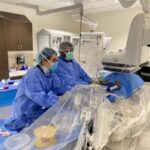 Nearly three years after its adoption, the Patients Right to Know About Adverse Medical Incidents Law, or Amendment 7, remains controversial for health care providers. Amendment 7 created a constitutional right for patients to have access to records of providers adverse medical incidents that caused or had the potential to cause injury or death. It also abrogated the confidentiality previously afforded to providers peer review, risk management and quality assurance records, and has adversely affected medical review activities.
Nearly three years after its adoption, the Patients Right to Know About Adverse Medical Incidents Law, or Amendment 7, remains controversial for health care providers. Amendment 7 created a constitutional right for patients to have access to records of providers adverse medical incidents that caused or had the potential to cause injury or death. It also abrogated the confidentiality previously afforded to providers peer review, risk management and quality assurance records, and has adversely affected medical review activities.
Florida law has long mandated that hospitals maintain medical review programs to improve the quality of patient care. Because compelled disclosure is widely believed to jeopardize medical review programs by revealing the identity and opinions of the participants in medical review activities, Floridas legislature and courts consistently protected the confidentiality of medical review proceedings and records. Thus, the statutes mandating medical review also provided that medical review activities would not be subject to discovery or introduction into evidence, and participants could not be compelled to testify regarding the proceedings, in an action related to the medical review.
Although Amendment 7 stripped the records of their confidentiality, providers medical review obligations remained unchanged. When plaintiffs attorneys began demanding providers medical review records for use in medical malpractice litigation, Floridas legislature responded by enacting §381.028, Fla. Stat. The statute attempted to limit the scope of Amendment 7 by restricting the discoverability and admissibility of records of adverse medical incidents and limiting Amendment 7s applicability to records created, incidents occurring, and actions pending on or after the Amendments adoption. In legal challenges to §381.028, at least two courts found the statute unconstitutional. The issue is now before the Florida Supreme Court. Although the Supreme Court has not yet ruled, it is likely that it, too, will strike down the statute, leaving Amendment 7 intact.
Even without the limitations of §381.028, Amendment 7 does not permit unfettered access to medical review records. Amendment 7 inquiries are limited to records of “adverse medical incidents,” defined as medical negligence, intentional misconduct, or any act or failure to act that caused or could have caused injury or death to a patient. Amendment 7 does not require disclosure of routine credentialing or medical review activities where the patient was not at risk of injury or death. Nor did Amendment 7 repeal existing statutory prohibitions on the introduction of medical review records into evidence or compelling medical review participants to testify about those activities. Records that may be responsive to Amendment 7 requests should be closely scrutinized with legal counsel to determine if the records are required to be disclosed.
Notwithstanding Amendment 7, confidentiality as a prerequisite to an effective medical review program remains a viable concept, and was reaffirmed when the federal “Patient Safety and Quality Improvement Act of 2005” became law. The Act provides that a hospitals “patient safety work product,” which consists of the same documents and information that are the subject of Amendment 7, is privileged and confidential if certain criteria are met, and shields patient safety work product from discovery in all civil proceedings, notwithstanding any contrary state, federal or local law. Once the Act is implemented, providers should be able to resume vigorous medical review activities without the chilling effect of compelled disclosure.
Post Views: 1,057
 Nearly three years after its adoption, the Patients Right to Know About Adverse Medical Incidents Law, or Amendment 7, remains controversial for health care providers. Amendment 7 created a constitutional right for patients to have access to records of providers adverse medical incidents that caused or had the potential to cause injury or death. It also abrogated the confidentiality previously afforded to providers peer review, risk management and quality assurance records, and has adversely affected medical review activities.
Nearly three years after its adoption, the Patients Right to Know About Adverse Medical Incidents Law, or Amendment 7, remains controversial for health care providers. Amendment 7 created a constitutional right for patients to have access to records of providers adverse medical incidents that caused or had the potential to cause injury or death. It also abrogated the confidentiality previously afforded to providers peer review, risk management and quality assurance records, and has adversely affected medical review activities. 

























